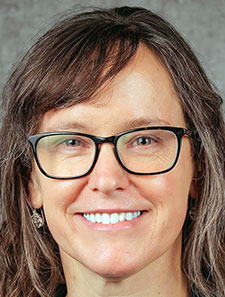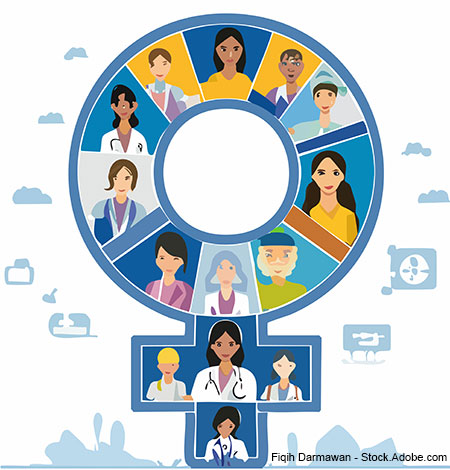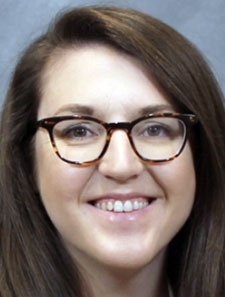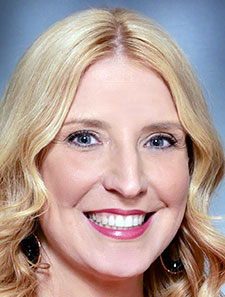 Women hospitalists have seen advances in the care of female patients, but also in their careers within hospital medicine. However, there are still some bridges to cross to ensure that female patients feel fully heard and seen and that female hospitalists feel they can pursue their careers with equity.
Women hospitalists have seen advances in the care of female patients, but also in their careers within hospital medicine. However, there are still some bridges to cross to ensure that female patients feel fully heard and seen and that female hospitalists feel they can pursue their careers with equity.
The Hospitalist recently spoke with five female hospitalists who paved the way in making healthcare and healthcare careers for women easier to navigate. Here are some highlights from what they shared.
Lessons from Childbirth

Dr. Defoe
Maya Defoe, MD, assistant professor of medicine and recruitment director in the division of hospital medicine at Northwestern University Feinberg School of Medicine in Chicago
Dr. Defoe can recall returning to work at Northwestern University about eight years ago after having her first child and feeling like “a total mess.” She was also struggling with postpartum depression.
“I felt like I needed to keep up with my roles and all my clinical tasks, and I was just starting to make a name in my division,” she said. “I had to pretend like I was fine.”
It wasn’t until she went to a national conference six or seven months into her work return that a fellow female physician at a speed mentorship session heard what Dr. Defoe had been going through and let her know she shouldn’t be expected to maintain the steep trajectory curve for her career for at least a year or perhaps longer.
“I thought, ‘I wish someone had told me that,’” she said. “That started my desire to help other women in the same position.”
That led Dr. Defoe to work on a multicenter, survey-based study that compared the career paths of men and women academic hospitalists.1 That research found that women academic hospitalists experienced more adverse impacts on their personal lives and careers compared to men who took extended leaves and non-traditional work arrangements.
“Essentially, women just have far more negative effects from non-linear careers than men do,” Dr. Defoe said. “That can include maternity leaves and other gaps.”
Dr. Defoe says that women are at a disadvantage because in most cases, parenting duties fall on the mother, even if the father is able to take off for a few weeks after a baby’s birth, and that “invisible workload” continues throughout the child’s life.
Her second child was born around the start of the COVID-19 pandemic; she also experienced post-partum depression then, but she took more time off rather than powering through it. “I think the reason I’m still here five years later is because I took that break,” she said.
In addition to her study findings, Dr. Defoe has helped pave the way for women hospitalists by helping to create a manual for women within her hospital system going on maternity leave. It addresses items like when maternity leave actually starts (on your expected due date, even if you deliver late) and ways to potentially extend your maternity leave (e.g., working more shifts during pregnancy or decreasing total full-time equivalents for the year).
Dr. Defoe strongly encourages women hospitalists who are planning a family and are new to the specialty to find a mentor in advance. “You don’t have to be alone in trying to strategize if you’re having trouble,” she said.
Also, don’t feel as if you need to do everything all at once. “Look at your career as a marathon. Focus on what you need to focus on and do what you need to do. There are always opportunities when you want to jump back in and make a name for yourself,” she said.
She also has hope for the future of women in hospital medicine within the realm of starting a family. “I feel like things are (getting better) because people are actually talking about it,” she said. Although she worries about the current political climate that puts less of an emphasis on diversity, she also says that a focus on starting families should be a concern for everyone.
Advancing Women’s Health

Dr. Barrett
Eileen Barrett, MD, MPH, senior medical director and vice president of quality at WorkItHealth, and president of the American Medical Women’s Association
Like many hospitalists, Dr. Barrett is internal medicine trained, so she went through residency without a significant focus on women’s health. Instead, she had to seek out training and experiences on her own to provide the care that women deserve.
“That ranged from a trauma-informed approach, to pelvic exams to offering family planning, to medically complex patients, to adopting communication strategies that acknowledge that many women have had negative experiences with the healthcare system because of bias and discrimination,” Dr. Barrett said.
One challenge she continues to find is that sex- and gender-specific care is often an afterthought, whether that means finding a speculum on an internal medicine ward or difficulties providing an intrauterine device or Depo-Provera because they are not reimbursed in the hospital, or the simple fact that women’s symptoms are often dismissed or minimized.
Dr. Barrett’s passion for better women’s health led to successfully advocating for the ability to administer Depo-Provera prior to discharge for women who desired it, even if it was not reimbursed, and then helping to coordinate outpatient care for ongoing contraceptive access.
“I am passionate about people having control over their reproductive health, and with increasing difficulties accessing this quickly, it’s important that all clinicians provide desired contraception or a referral when someone wants it,” she said.2
 Dr. Barrett’s passion also led to involvement with the American Medical Women’s Association, which focuses on advancing women in medicine and improving women’s health. She is currently the group’s president. Dr. Barrett said she started by participating on committees, partnering with mentees on abstract submissions, and attending the group’s annual meeting.
Dr. Barrett’s passion also led to involvement with the American Medical Women’s Association, which focuses on advancing women in medicine and improving women’s health. She is currently the group’s president. Dr. Barrett said she started by participating on committees, partnering with mentees on abstract submissions, and attending the group’s annual meeting.
There’s another piece of the women’s healthcare puzzle that Dr. Barrett would like to find more often. “I hope more allies lean into their courage to support a future with more hospitalists embracing women’s health and also by advancing the careers of women in medicine. We all do better when women get comprehensive care and when women leaders are in environments where they can reach their potential,” she said.
Using QI to Improve Care

Dr. Humes
Kathryn Humes, MD, FACP, assistant professor of medicine and associate program director for quality improvement and patient safety curriculum at Augusta University’s Medical College of Georgia in Augusta, Ga.
Due to a hospital system issue, while a resident, Dr. Humes and several others at the hospital made a mistake in the dosing of a dangerous medication. Although there was no lasting damage, she learned that even providers with the best intentions are capable of negative outcomes.
That’s led to her own focus on quality improvement in her role at the Medical College of Georgia, where she founded and spearheads the quality improvement (QI) curriculum.
On a practical level, Dr. Humes’ focus on women’s healthcare often comes down to advocating for female patients. “Many times, it feels that the complaints of women go unnoticed or less noticed than those of their male counterparts,” she said. “I’ve seen many women endure significant pain or hardship due to their concerns not being taken as seriously.” She has also made similar observations as a female clinician, with her own ideas or concerns not acknowledged as often. “Sometimes, I’ve felt like an ‘annoying little girl’ rather than a female faculty leader and QI expert,” she said.
Through her mentorship of resident physicians and work within QI, Dr. Humes says she has helped other women feel empowered to speak up and has served on leadership committees to support conferences and support groups for women.
Dr. Humes has also supported resident-led QI projects to make a women’s health curriculum for residents and to refer potential victims of domestic abuse or assault and human trafficking. The latter project was able to show a significant increase in the level of comfort residents have when addressing this topic with patients and fostering an awareness of available resources and referral options.
“By being visible and showing others that our voices matter as women, we can make lasting change in the medical profession and medical education,” she said.
With women outnumbering men in medical school, Dr. Humes is optimistic about the future for female clinicians as well as female patients. “I hope to see more support for working moms with more flexibility and acknowledgement of the challenges of balancing family and high-intensity careers,” she said.
When someone asked her how she is able to do it all as a working mom and a hospitalist leader, she used to say, “I don’t!” and would emphasize all the types of help she gets.
“All of that is still true, but I’ve come to learn to give myself more credit and grace,” she said. “Maybe ‘all’ means different things to different people, and I’m not the class mom at school every week. But I’m showing my kids what it means to be a strong female role model, and I’m grateful to get to prioritize what makes my family and me happy, which includes having a successful career and being blessed with the opportunity to help people every day.”
Guiding Future Leaders

Dr. Awosika
Bi Awosika, MD, FACP, SFHM, assistant dean and phase 1 and 2/3 career advisor at the University of Cincinnati College of Medicine, chair of the resident clinical competency committee, associate program director of the internal medicine residency program, hospitalist, and associate professor of medicine at the University of Cincinnati Medical Center in Cincinnati
Early in their career, many women hospitalists may feel pressure to have everything figured out, which can lead to self-reflection filled with angst and uncertainty, says Dr. Awosika. “It can also lead to passively following the motions with years passing, looking back, and trying to find additional joy and purpose. Because of this and depending on the environment, women in hospital medicine confront the challenge of being able to find the right mentor(s) who can help facilitate their development to align with their needs and goals,” she said.
Dr. Awosika became involved in hospital QI processes early in her career, when she was at MedStar Georgetown University Hospital in Washington, D.C. She would take part in hospital committees to address challenges related to patient throughput and facilitating smooth care transitions. “This experience opened my eyes to how a multidisciplinary team approach, involving diverse expertise, can bridge gaps in health disparities and promote equitable care,” she said.
To help women hospitalists and those new to the specialty find their way, Dr. Awosika wears many hats. She participates in task forces focused on creating equitable and inclusive learning and working environments. She is an official faculty mentor to provide guidance to junior faculty. She was also part of SHM’s Physicians-in-Training Committee.
Dr. Awosika says she values the chance to guide women at all levels, whether it’s providing support for peers to share the joys of hospital medicine, assisting undergraduate medical education students as a career advisor, or sharing the scoop on hospital medicine with pre-health students.
“It’s been a true privilege to know that these efforts help not only further their dreams but to bridge the gap to improve equity for women as they cultivate their skillsets and competencies to propel them towards success in their potential roles in the future,” she said.
Dr Awosika is also active in the nonprofit Greater Cincinnati Women Walking West, which supports women who were born internationally and continue to pursue their education in the U.S. As a first-generation Cameroonian American and the first in her family to pursue medicine, she has found it inspiring to share stories and encouragement with those interested in careers in medicine.
Dr. Awosika says that she is hopeful as women physicians continue to rise within the specialty and that awareness of inequities helps to open doors and allow them to be seen. Her advice for women aspiring to work in hospital medicine? Take your time to intentionally cultivate your niche in hospital medicine. “Your crafting may take involvement in several activities at first within the early phases of your career, but continue to truly reflect on what drives you and brings you back to your ‘why’,” she said.
She also recommends focusing on the career path that suits you best, versus feeling competitive with others. “Remember that the closing of one door may just be the impetus needed for you to thrive when another one opens,” she said.
Expanding your village through mentorship and sponsorship is also crucial, she adds.
Elevating Career Paths for Women

Dr. O’Toole
Jennifer K. O’Toole, MD, MEd, SFHM, associate dean for graduate medical education at the University of Cincinnati College of Medicine, designated institutional official at the University of Cincinnati Medical Center and West Chester Hospital, vice chair of faculty affairs in the department of internal medicine, and tenured professor of internal medicine and pediatrics at the University of Cincinnati in Cincinnati
Meds-peds hospitalist Dr. O’Toole became interested in elevating the career paths for women hospitalists early in her career, when she often found herself one of the few women in a leadership position in various spaces. Her first child was still young at that time, so she was navigating the career-life challenges many women encounter during that time of life.
A few years into her career, she received a substantial salary adjustment when her hospital medicine group became an independent division. The reason? She had a lower salary compared with others within the division, and it was caught during an equity review. “I started my job as a hospitalist right out of my chief resident year and didn’t know I had the opportunity to negotiate my salary,” Dr. O’Toole said. She estimates that she lost a few years of the extra salary because she didn’t know to ask for more.
As a result of these experiences and a strong desire to help other women entering the field of hospital medicine, Dr. O’Toole began to get involved with different national projects with a focus on helping elevate women in medicine and leadership. Her current role as designated institutional official and associate dean for graduate medical education has given her a platform with great exposure to hospital leaders through which she can continue to advocate for opportunities for women in medicine.
Dr. O’Toole was also chair of the 2018 Pediatric Hospital Medicine meeting that featured a plenary on gender differences in medicine. That plenary led to a discussion with a group at the meeting about how to continue to advocate for advancement and leadership opportunities for women in pediatric hospital medicine, a specialty that is about two-thirds women. This led Dr. O’Toole and other colleagues to form ADVANCE PHM, an organization committed to promoting advancement and leadership opportunities for women in hospital medicine.
That group has since evolved to focus on promoting allyship and developing modern leaders in hospital medicine. “It’s not about fixing the individual to allow them to be more successful in the system. It’s really about how to change the entire system to promote advancement and opportunity for all,” she said.
Dr. O’Toole advises women entering hospital medicine to find mentorship early on and get leadership training—even if you don’t plan to pursue a leadership role. Leadership training helps you function effectively on the multidisciplinary teams you are a part of and benefits your advocacy efforts for patients, colleagues, and learners. Dr. O’Toole praises the course Hedwig van Ameringen Executive Leadership in Academic Medicine® (ELAM®) fellowship program at Drexel University College of Medicine, which she just finished in May, as a pivotal leadership training experience in her career.
She also believes it’s important to give yourself grace. “Our jobs are hard, and our patients, colleagues, and bosses expect the best from us. Sometimes, this requires giving yourself some grace when you can’t do it all, but recognizing that you can still do a lot,” she said.
Vanessa Caceres is a medical writer in Bradenton, Fla.
References
- Defoe MV, et al. Men and women pursue nonlinear career paths, but impacts differ: a cross-sectional study of academic hospitalists. J Gen Intern Med. 2022;37(12):3097-104. https://doi.org/10.1007/s11606-022-07402-x.
- Barrett E and Chambers-Kersh L. Urgent call to action: engaging hospitalists in family planning. Ann Intern Med. 2022;175(9):1324-1325. https://doi.org/10.7326/M22-1450.